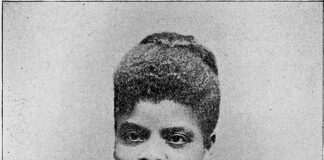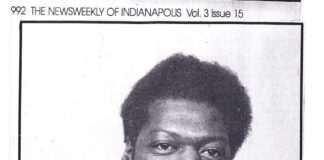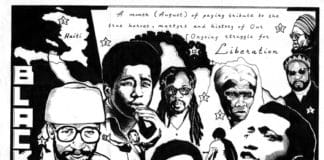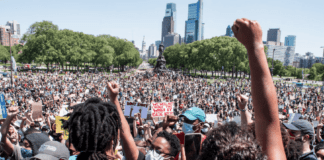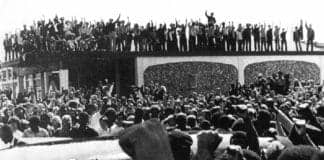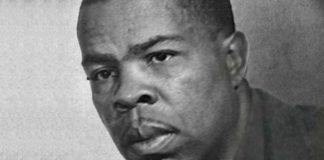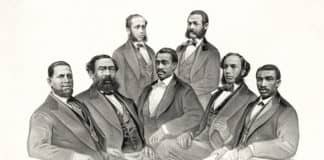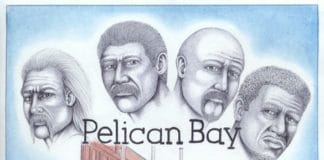Tags W.E.B. Du Bois
Tag: W.E.B. Du Bois
Ida B. Wells-Barnett is a sterling example for all incarcerated journalists
We know her name – Ida B. Wells-Barnett – but do we know how her very essence laid the groundwork for, and is woven deeply into the fabric of, today’s struggles? Uhuru B. Rowe, with elegance and expertise draws a powerful picture for our enlightenment about this profound human icon.
Lifelong fighter for prisoners’ rights: Hugh Ray Lyons Jr., presente!
Victor Wallis remembers his friend, Hugh Lyons, incarcerated numerous times in IDOC’s Pendleton Correctional Facility. Lyons’ humanity, buoyant spirit, sensitive, compassionate and gifted aspects, seen also in so many other prisoners, are today even more systematically discounted and disregarded by the Indiana Department of Corrections.
Black August 2020: All eyes on us to save our youth
From behind the enemy lines, within the “Belly of the Beast” that is the Amerikan injustice system, I invite my fellow prisoners and their families throughout Amerika to celebrate the annual commemoration of Black August. Join together in honoring our beloved martyrs with fasting, studying and sharing Panther Love and knowledge, in the spirit of our fallen comrades.
From ‘movement moments’ to change, from the Red Summer to Black...
It is said that Mark Twain once quipped that “history does not repeat itself, but it rhymes.” One cannot escape comparisons with 1968, and with widespread civil unrest, troops in the streets, warring abroad and a rabidly reactionary Republican president seeking re-election while executing his own Southern Strategy replete with dog-whistle appeals to “law and order,” such comparisons are not without merit.
Harriet as Igbo
by Biko Agozino
This is not a spoiler. “Harriet” is a film without spoilers because the audience already can tell how the movie was going...
Wanda’s Picks for December 2019
Within the craziness, artists like Cherie Hill, Gabriel Christian and Chibueze Crouch have opened with their work windows into spaces where Blackness – just everyday Blackfolkness – is a ticket or key or pass code into rooms others seated behind us out of sight and mind/full/ness cannot enter.
Black August: The power of prisoner-led organizing
“Settle your quarrels, come together, understand the reality of our situation, understand that fascism is already here, that people are dying who could be saved, that generations more will die or live poor butchered half-lives if you fail to act. Do what must be done, discover your humanity and your love of Revolution. Pass on the torch. Join us, give your life for the people.” – George Jackson
Journalist, poet Frank Marshall Davis (1905-1987) fought fascism to cure the...
Journalist and poet Frank Marshall Davis is an important voice who channeled his social convictions through the power of the pen, and proved to be an unsung hero in the struggle for human rights. "Frank Marshall Davis established his reputation as a socially minded poet employing free-verse forms.” His work has been recognized by the National Poetry Foundation, stating on their website: “Davis concerned himself with portraying Black life, protesting racial inequalities, and promoting Black pride.”
How about erecting monuments to the heroes of Reconstruction?
There is an alternative politics of memory that Americans can also practice, and it might help to keep fascists out of public squares and do something concrete, literally at the same time: Honor Reconstruction. Remembering Reconstruction ought not to shunt aside the politics of Confederate memorials. Yet remembering this pivotal era certainly deserves to be built into the new national politics of memory. The sesquicentennial of Reconstruction is September 1, 2017.
Why Hillary Clinton doesn’t deserve the Black vote
The love affair between Black folks and the Clintons has been going on for a long time. It began back in 1992, when Bill Clinton was running for president. What have the Clintons done to earn such devotion? Did they take extreme political risks to defend the rights of African Americans? Did they courageously stand up to right-wing demagoguery about Black communities? Did they help usher in a new era of hope and prosperity for neighborhoods devastated by deindustrialization, globalization and the disappearance of work? No. Quite the opposite.
The mind that sees: The third eye of Eslanda Goode Robeson
Her name was Eslanda Cardozo Goode Robeson, and she was brilliant! But what is perturbing is that evidence of her enormous body of work as a photographer has vanished, as though she did not exist! But exist she very much did indeed! Eslanda Robeson lived and made an impact in the world. She was a writer, storyteller, intellectual, adventurer, scientist, anthropologist, political analyst, artist, anti-colonialist activist and a woman of principle.
Prisoners’ Agreement to End Hostilities as the basis for the abolition...
On Oct. 10, 2012, the Pelican Bay D-Short Corridor Collective, men from various cultural groups and walks of life, put into effect the historic “Agreement to End Hostilities,” perhaps the single most significant “door to genuine freedom” opened in American society in recent human history. What makes it so significant is not simply its motive force but, more importantly, its true potential for our collective liberation as a society.
Inside a CCA private prison: Two slaves for the price of...
In 1973, the National Advisory Commission on Criminal Justice Standards and Goals issued a report which stated in part: “The prison, the reformatory and the jail have achieved only a shocking record of failure. There is overwhelming evidence that these institutions create crime rather than prevent it.” This same report stated directly: “No new institutions for adults should be built and existing institutions for juveniles should be closed.”
What is Juneteenth and why are 42 states and the District...
When Maj. Gen. Gordon Granger issued General Orders, Number 3, he had no idea that, in establishing the Union Army’s authority over the people of Texas, he was also establishing the basis for a holiday, “Juneteenth” (“June” plus “nineteenth”), today the most popular annual celebration of emancipation from slavery in the United States.
Black history maker Esther Cooper Jackson 1917-
Esther Cooper Jackson, born in Arlington, Virginia, graduated from Ohio’s Oberlin College, received her MA degree in sociology from Fisk University, then remarkably turned down a scholarship offer to Chicago University to earn a PhD to relocate to Birmingham, Ala., where she became the organizational secretary for the Southern Negro Youth Congress.
The legend of Lincoln unchained
Just as organizations like the NAACP denounced conservative-revisionist textbooks in Texas in 2010, they should denounce liberal-bent historical accounts that either ignorantly or deliberately fail to concede that “Abraham Lincoln did the right thing for the wrong reasons.” Or as Lerone Bennett aptly conveyed in the title of his book, Lincoln was in effect “Forced Into Glory.”
The rich heritage of Africa in the West
"The ever-present propaganda campaign of white superiority and Black inferiority, since slavery, has succeeded in rewriting history without its African roots and has continued to downplay Africa’s contribution to civilization and to the world as we know it. If Africa were more effectively promoted as the birthplace of civilization and the beginning source of all sophisticated culture, the myth of Black inferiority would be forced out of society because it would then be evident that we are all connected and, ultimately, all African." – DeBray Carpenter, aka Fly Benzo
DeVoine Entertainment celebrates 146 years of Black independence
As we pay tribute to the legends and pioneers of Juneteenth, like early Juneteenth pioneer Rev. Jack Yates (John Henry Yates), we give a special salute and on-stage re-creation of one of the early Juneteenth celebrations, then called “Freedom Day Celebrations,” by ex-slaves in a nightclub.
Malcolm and the music
El-Hajj Malik El-Shabazz (Malcolm X), born 86 years ago on May 19, 1925, was loved by the oppressed and hated by the oppressors. Our “Black Shining Prince,” in the words of Ossie Davis, aimed to “use whatever means necessary to bring about a society in which the 22 million Afro-Americans are recognized and respected as human beings.” His influence is immeasurable - from music to foreign policy to religion. Today Islam, followed then by very few, is the second largest religion in the United States and Canada.
Malcolm X, Barack Obama and Oginga Odinga
El-Hajj Malik El-Shabazz (Malcolm X) was assassinated 44 years ago, on Feb. 21, 1965, because of his attempt to internationalize the African American struggle for self-determination.




